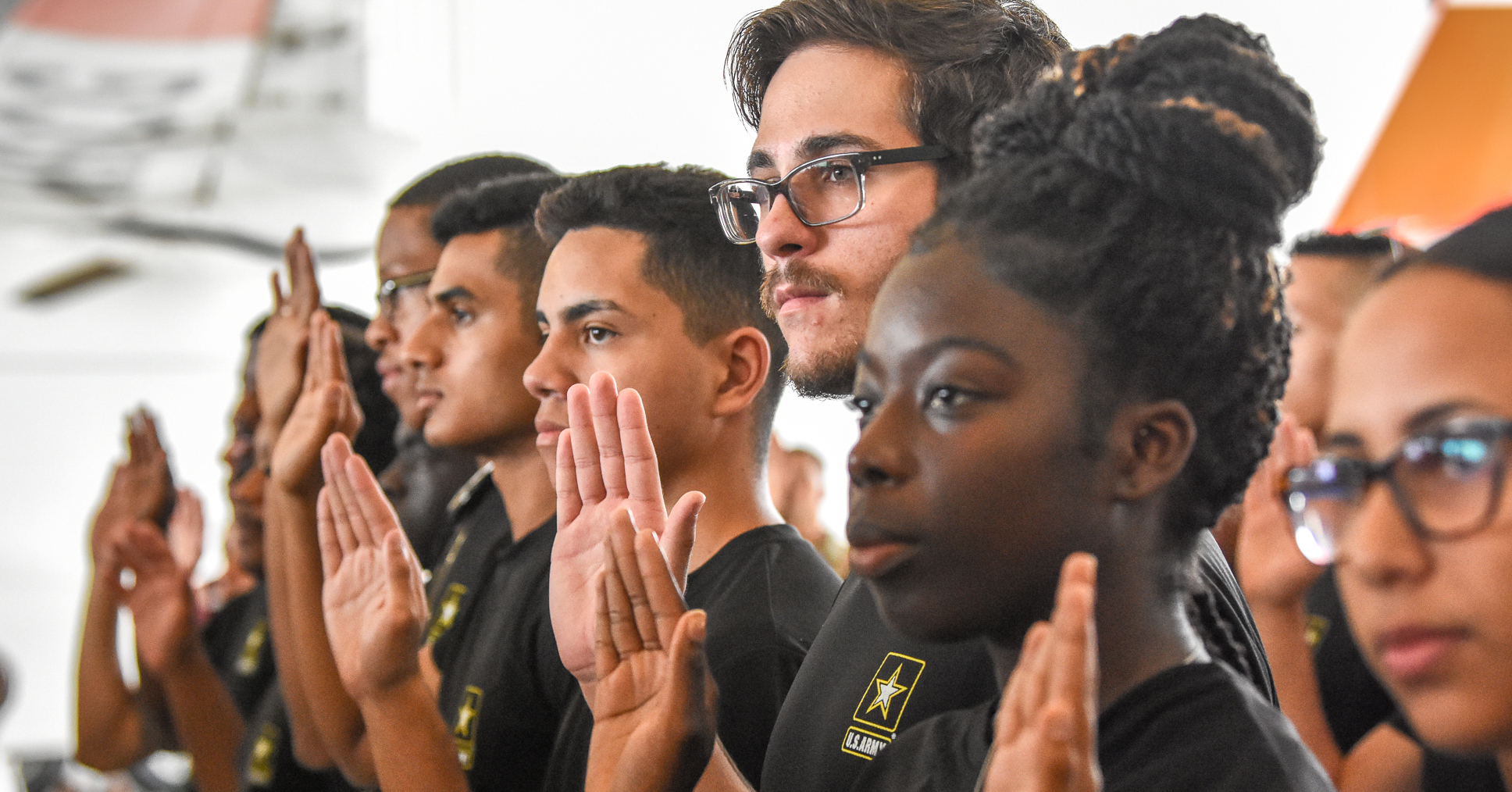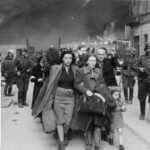
In September 2019 we introduced you to the Eisenhower Series College Program (ESCP). Though we are approaching life as we remember it pre-COVID, travel limitations significantly limited the ESCP from visiting colleges and universities, interacting with audiences often unfamiliar with members of the U.S. Military. It is our hope at WAR ROOM to bring you a glimpse of what some of those presentations might have looked like via A BETTER PEACE.
In this first episode of academic year 2021 our podcast editor Ron Granieri is joined by War College students and ESCP members Rebecca Connally, Aixa Dones and Adisa King. In their conversation they share their personal thoughts and experiences as career military officers and leaders in the U.S. Army and Marine Corps. They try and tackle the question of how well either the armed forces or American society as a whole have lived up to their stated values of diversity, equity and inclusion. They discuss where they have seen success and failure and what the path looks like going forward.
Sometimes people are more focused on quantity, vice opportunity, and I think what’s first and foremost important is that we need to focus on opportunity. Does the opportunity exist? And as of 2013, when it comes to a gender side of the house, opportunity exists for women no matter what.
Podcast: Download
Subscribe: Apple Podcasts | Spotify | Amazon Music | Android | Pandora | iHeartRadio | Blubrry | Podchaser | Podcast Index | TuneIn | Deezer | Youtube Music | RSS | Subscribe to A Better Peace: The War Room Podcast

COL Rebecca Connally is a U.S. Army officer with over 22 years of active service. She has a bachelors degree from Texas A&M and a law degree from Syracuse. Colonel Connolly has advised commanders on the law of war and rules of engagement in combat operations as well as prosecuted federal cases in military courts martial. She also served as a military judge at Fort Hood from 2013 to 2016.
LtCol Aixa Dones enlisted in the Marine Corps in 1994. She graduated from the University of Illinois at Chicago in 2001 with a degree in criminal justice and was commissioned as an officer in the United States Marine Corps in 2002. She has experience in signals intelligence and human resources and has been a part of humanitarian efforts in Guantanamo Bay, Cuba, and combat operations in Iraq. She has been selected to assume command of 4th Recruit Training Battalion, Parris Island, South Carolina in July 2021.
COL Adisa King graduated from the United States Military Academy in 2000 as an infantry officer. He has served in mechanized, airborne, and air assault units in the United States and Korea, and has multiple deployments to Afghanistan and Iraq where he most recently served as a task force commander and senior adviser to Iraqi Army commanders. He has served in the Senate liaison division within the DoD Office of Chief of Legislative Liaison in Washington DC, and as the military aide to the Secretary of the Army.
Ron Granieri is an Associate Professor of History at the U.S. Army War College and the Editor of A BETTER PEACE.
The views expressed in this presentation are those of the speakers and do not necessarily reflect those of the U.S. Army War College, U.S. Army, or Department of Defense.
Photo Description: Future U.S. Army Soldiers take the Oath of Enlistment during the Air and Sea Show at Miami Beach, Florida, Sept. 17, 2019.
Photo Credit: U.S. Army photo by Lara Poirrier





From time to time, we might wish to consider, again, the suggested basis for embracing — and indeed for striving to be the very best at — such things as “diversity, equity and inclusion.”
From what I understand, this has a lot to do with “surviving,” with “winning” (in every sense of the word?) and with, accordingly, determining who will “lead, dominate and direct” the modern world today and going forward.
This, given that it is said that organizations and countries — with strong diversity, equity and inclusion strategies and programs — that these such organizations and countries will (a) be able to attract the world’s top talent and, thus (b) be able to drive necessary innovation today and going forward; this, (c) causing their less-diverse, etc., competitor organizations and countries to (1) be left far behind in this new “modernization” process/era and, thus, (2) become much more vulnerable to easy defeat and/or takeover therein.
Bottom Line Question — Based on the Above:
If the perspective and theory offered above is correct, then “diversity, equity and inclusion” — and the example that the United States Army and the United States as a whole sets as to these such matters (to wit: this aspect of our “soft power?”) — this would seem to be one of America’s top national security prerequisites, priorities and imperatives today.
If such indeed is the case, then is it possible that our national leaders might now join forces with our business and other leaders; this, to more loudly, consistently, formally and officially —
a. “Shout this from the roof tops” and, thus,
b. Make this point become much more clear, apparent and better understood by the American people?
(Such an effort going a long way to helping the American people understand [a] the exceptionally adverse national national security consequences of [b] not embracing such “further modernizing” requirements as “diversity, equity and inclusion?”)
The discussion ignores many issues and makes claims to authority due to research but none is cited.
Women, in general, are less able physically and suffer disproportionate medical risks if deployed in combat units. Women fail the new US Army gender neutral fitness test at much higher rates than men. The US Marine Corps experiment with mixed men and women units of infantry performed more poorly than all male units. The biggest difference is culture and offense rates among different races and nationalities.
Poverty and Culture by Lawrence M. Mead
In the West most people are individualists. That is, they view life as a project. They focus on their own inner goals and values—such as achieving the American dream—and they seek to realize these out in the world. So their lives flow from the inside out. In the non-West, however, a more cautious and collective mindset usually prevails. Most people have little sense that they are separate from society, and they primarily seek to adjust to the demands made by the outside world, rather than seeking change. The chief goal is simply survival, not advancement. So life flows from the outside in. This general contrast holds true despite the great diversity of cultures in both the West and non-West.5
A second major contrast is that the West tends to be moralistic about ethics, while the non-West is more conformist. Westerners typically understand right and wrong as principles that are general and abstract, valid in all times and places. They internalize these norms—such as telling the truth, keeping promises, and obeying the law—as children and then apply them to themselves, other people, and government in later life. In the non-West, however, ethics are more situational and dependent on context. People mostly understand right and wrong in terms of what the people around them expect of them. So there is less sense of absolute standards and less sense of individualized responsibility.
Today, the seriously poor are mostly blacks and Hispanics, and the main reason is cultural difference. The great fact is that these groups did not come from Europe. Fifty years after civil rights, their main problem is no longer racial discrimination by white people but rather that they face an individualist culture that they are unprepared for. Their native stance toward life is much more passive than the American norm. In America, they face less hardship than they did where they came from, but also more competition. They now must strive to get ahead in school and the workplace while avoiding crime and personal problems. They also must take much more responsibility for themselves than they did before. In short, they have to become more individualist before they can “make it” in America. They are thus at a disadvantage competing with the European groups—even if they face no mistreatment on racial grounds.
https://www.nas.org/academic-questions/34/1/poverty-and-culture
Why Scholars Won’t Research Group Differences by Mark Mercer
In that paper, and then in a 2011 book, Science in a Democratic Society,2 Kitcher stated two further conclusions: that professors and universities (and other public institutions) should actively discourage research into sex differences, ethnic differences, and racial differences;
https://www.nas.org/academic-questions/33/4/why-scholars-wont-research-group-differences
Race and Ethnicity of Violent Crime Offenders and Arrestees, 2018 Allen J. Beck, Ph.D., BJS Statistician
https://www.bjs.gov/content/pub/pdf/revcoa18.pdf
“Leading Causes of Death – Males – Non-Hispanic black – United States, 2017,” Center for Disease Control
https://www.cdc.gov/healthequity/lcod/men/2017/nonhispanic-black/index.htm
“Violent Crime Arrestee Race – 2019” Colorado Crime Statistics
https://coloradocrimestats.state.co.us/public/View/dispview.aspx?ReportId=38&MemberSelection_%5BIncident%20Date%5D.%5BIncident%20Date%20Hierarchy%5D=2019&MemberSelection_%5BJurisdiction%5D.%5BJurisdiction%20Hierarchy%5D=CO
Sowell, Thomas, Discrimination and Disparities: Revised and Enlarged Edition, Basic Books, New York, 2019
Women in combat roles face these “disproportionate medical risks”
https://hotair.com/jazz-shaw/2017/07/26/women-combat-roles-facing-disproportionate-medical-risks-n247525
How The Army Tried To Avoid Telling The Truth About Women In Ranger Training
https://dailycaller.com/2019/08/29/us-army-accused-lowering-standards-female-rangers/
Men and Women Seeing Different Failure Rates on Army’s Gender-Neutral Fitness Test
https://www.military.com/daily-news/2019/10/15/men-and-women-seeing-different-failure-rates-armys-gender-neutral-fitness-test.html
Mixed Gender Teams Come Up Short In Marines Infantry Experiment
https://www.marinecorpstimes.com/news/your-marine-corps/2015/09/10/mixed-gender-teams-come-up-short-in-marines-infantry-experiment/